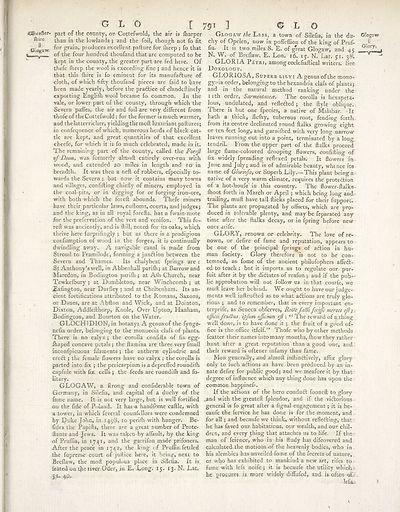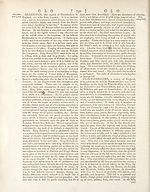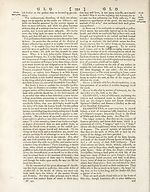Encyclopaedia Britannica > Volume 7, ETM-GOA
(867) Page 791
Download files
Complete book:
Individual page:
Thumbnail gallery: Grid view | List view

G L O [ 791 ] © L O
GJbcefler- part of the county, or Cottefwold, the air is fliarper
f[lire than in the lowlands ; and the foil, though not fo fit
Gio aw ^or £ra*n’ P’oduces excellent pafiure for iheep ; fo that
k . of the four hundred thoufand that are computed to be
kept in the county, the greater part are fed here. Of
thefe fheep the wool is exceeding fine ; and hence it is
that this (hire is fo eminent for its manufafture of
cloth, of which fifty thoufand pieces are faid to have
been made yearly, before the pra&ice of clandeftinely
exporting Englilh wool became fo common. In the
vale, or Ipwer part of the county, through which the
Severn paffes, the air and foil are very different from
thofe of the Cottefwold: for the former is much warmer,
and the latter richer, yielding the moft luxuriant paftures;
in confequence of which, numerous herds of black cat¬
tle are kept, and great quantities of that excellent
cheefe, for which it is fo much celebrated, made in it.
The remaining part of the county, called the Forejl
of Dean, was formerly almoft entirely over-run with
wood, and extended 20 miles in length and 10 in
breadth. It was then a neft of robbers, efpecially to¬
wards the Severn ; but now it contains many towns
and villages, confiffing chiefly of miners, employed in
the coal-pits, or in digging for or forging iron-ore,
with both wdiich the foteft abounds. Thefe miners
have their particular laws, cuftoms, courts, and judges;
and the king, as in all royal forefts, has a fwain-mote
for the prefervation of the vert and venifon. This fo-
reft was anciently, and is Hill, noted for its oaks, which
thrive here furprifingly ; but as there is a prodigious
confumption of wood in the forges, it is continually
dwindling away. A navigable canal is made from
Stroud to Framilode, forming a jun&ion between the
Severn and Thames. Its chalybeat fprings are :
St Anthony’s well, in Abbenhall parifli; at Barrow and
Maredon, in Bodington parifli; at Afli-Church, near
Tewkefbury ; at Dumbleton, near Winchcomb ; at
jEafington, near Durfley ; and at Cheltenham. Its an¬
cient fortifications attributed to the Romans, Saxons,
or Danes, are at Abfton and Wick, and at Dointon,
Dixton, Addlefthorp, Knole, Over Upton, Hanham,
Bodingcon, and Bourton on the Water.
GLOCH1DION,in botany: Agenusof the fynge-
nefia order, belonging to the monoecia clafs of plants.
There is no calyx ; the corolla confifts of fix egg-
Ihaped concave petals; the ftamina are three very fmall
inconfpicuous filaments; the antherse cylindric and
eredt; the female flowers have no calyx ; the corolla is
parted into fix ; the pericarpium is a depreffed roundifh
capfule with fix cells; the feeds are roundifli and fo-
litary.
GLOGAW, a ftrong and confiderable town of
Germany, in Silefia, and capital of a duchy of the
fame name. It is not very large, but is well fortified
on the fide of Poland. It has-a handfbme caftle, with
a tower, in which feveral counftllors were condemned
by Duke John, in 1498, to perifli with hunger. Be-
fides the Papiils, there are a great number of Prote-
ftants and Jews. It ivas taken by affault, by the king
of Pruflia, in 1741, and the garrifon made prifoners.
After the peace in 1742, the king of Pruffia.fettled
the fupreme court of juftice here, it being, next to
Brellaw, the moll populous place in Silefia. It is
feated on t}ie fiver Oder, in E. Long. 15. 13. N. Lat.
5^49-
Glogaw tAe Less, a town of Silefia, in the du¬
chy of Opelen, now in pofl'effion of the king of Pruf-
fia. It is two miles S. E. of great Glogaw, and 45
N. W. of Breflaw. E. Lon. i6i 15. N. Lat. 51. 38.
GLORIA Patri, among ecclefiallical writers. See
Doxologv.
GLORIOSA, Superb lily: A genus of the mono-
gynia order, belonging to the hexandria clafs of plants;,
and in the natural method ranking under the
11th order, Sarmentacea. The corolla is hexapeta-
lous, undulated, and reflefted ; the ftyle oblique.
There is but one fpecies, a native of Malabar. It
hath a thick, flefhy, tuberous root, fending forth
from its centre declinated round flalks growing eight
or ten feet long, and garnifhed with very long narrow
leaves running out into a point, terminated by a long
tendril. From the upper part of the (talks proceed
large flame-coloured drooping flowers, confiding of
fix widely fpreading reflexed petals. It flowers in
June and July; and is of admirable beauty, whence its
name oi Gloriofa, or Superb Lily—This plant being a
native of a very warm climate, requires the protection
of a hot-houfe' in this country. The flower-ftalks
(hoot forth in March or April; which being long and
trailing, mull have tall Hicks placed for their fupport.
The plants are propagated by offsets, which are pro¬
duced in tolerable plenty, and may be fcparated any
time after the llalks decay, or in fpring before new
ones arife.
GLORY, renown or celebrity. The love of re¬
nown, or defire of fame and reputation, appears to
be one of. the principal fprings of adtion in hu¬
man fociety. Glory therefore is not to be con¬
temned, as fome of the ancient philofophers affedl-
ed to teach: bnt it imports us to regulate our pur-
fuit after it by the didlates of reafon ; and if the pub--
lie approbation will not follow us in that courfe, we
mull leave her behind. We ought to have our judge¬
ments well inllrudted as to what adlions are truly glo¬
rious ; and to remember, that in every important en-
terprife, as Seneca obferves, Retie fatti feciffe merces eft}
officii frutlus- ipfum ojfficium ejl: “ The reward of a thing
well done, is to have done it ; the fruit of a good of¬
fice is the office itfelf.” Thofe who by other methods
fcatter their names into many mouths, flrow they rather -
hunt after a great reputation than a good one, and
their reward is oftener infamy than fame.
Men generally, and almolt inllindtively, affix glory
only to fuch adlions as have been produced by an in¬
nate defire for public good; and we meafure it by that
degree of influence which any tiring done has upon the
common, happinefs.
If the adlions of the hero condudl fooneft to glory
and with the greateft fplendor, and if the vidlorious
general is fo great after a fignal engagement; it is be-
caufe the fervice he has done is for the moment, and
for all ; and becaufe we think, without refledling, that
he has faved our, habitations, our wealth, and our chil¬
dren, and every thing that attaches us to life. If the
man of fcience, who in his lludy has difeovered and
calculated the motions of the heavenly bodies, who in
his alembics has unveiled-fome of thefecrets of nature,
or who has exhibited to mankind a new art, rifes to
fame with lefs noife ; it is becaufe the utility which
he procures is more widely diffufed, and is often of,
lef&-
Glegaw
GJbcefler- part of the county, or Cottefwold, the air is fliarper
f[lire than in the lowlands ; and the foil, though not fo fit
Gio aw ^or £ra*n’ P’oduces excellent pafiure for iheep ; fo that
k . of the four hundred thoufand that are computed to be
kept in the county, the greater part are fed here. Of
thefe fheep the wool is exceeding fine ; and hence it is
that this (hire is fo eminent for its manufafture of
cloth, of which fifty thoufand pieces are faid to have
been made yearly, before the pra&ice of clandeftinely
exporting Englilh wool became fo common. In the
vale, or Ipwer part of the county, through which the
Severn paffes, the air and foil are very different from
thofe of the Cottefwold: for the former is much warmer,
and the latter richer, yielding the moft luxuriant paftures;
in confequence of which, numerous herds of black cat¬
tle are kept, and great quantities of that excellent
cheefe, for which it is fo much celebrated, made in it.
The remaining part of the county, called the Forejl
of Dean, was formerly almoft entirely over-run with
wood, and extended 20 miles in length and 10 in
breadth. It was then a neft of robbers, efpecially to¬
wards the Severn ; but now it contains many towns
and villages, confiffing chiefly of miners, employed in
the coal-pits, or in digging for or forging iron-ore,
with both wdiich the foteft abounds. Thefe miners
have their particular laws, cuftoms, courts, and judges;
and the king, as in all royal forefts, has a fwain-mote
for the prefervation of the vert and venifon. This fo-
reft was anciently, and is Hill, noted for its oaks, which
thrive here furprifingly ; but as there is a prodigious
confumption of wood in the forges, it is continually
dwindling away. A navigable canal is made from
Stroud to Framilode, forming a jun&ion between the
Severn and Thames. Its chalybeat fprings are :
St Anthony’s well, in Abbenhall parifli; at Barrow and
Maredon, in Bodington parifli; at Afli-Church, near
Tewkefbury ; at Dumbleton, near Winchcomb ; at
jEafington, near Durfley ; and at Cheltenham. Its an¬
cient fortifications attributed to the Romans, Saxons,
or Danes, are at Abfton and Wick, and at Dointon,
Dixton, Addlefthorp, Knole, Over Upton, Hanham,
Bodingcon, and Bourton on the Water.
GLOCH1DION,in botany: Agenusof the fynge-
nefia order, belonging to the monoecia clafs of plants.
There is no calyx ; the corolla confifts of fix egg-
Ihaped concave petals; the ftamina are three very fmall
inconfpicuous filaments; the antherse cylindric and
eredt; the female flowers have no calyx ; the corolla is
parted into fix ; the pericarpium is a depreffed roundifh
capfule with fix cells; the feeds are roundifli and fo-
litary.
GLOGAW, a ftrong and confiderable town of
Germany, in Silefia, and capital of a duchy of the
fame name. It is not very large, but is well fortified
on the fide of Poland. It has-a handfbme caftle, with
a tower, in which feveral counftllors were condemned
by Duke John, in 1498, to perifli with hunger. Be-
fides the Papiils, there are a great number of Prote-
ftants and Jews. It ivas taken by affault, by the king
of Pruflia, in 1741, and the garrifon made prifoners.
After the peace in 1742, the king of Pruffia.fettled
the fupreme court of juftice here, it being, next to
Brellaw, the moll populous place in Silefia. It is
feated on t}ie fiver Oder, in E. Long. 15. 13. N. Lat.
5^49-
Glogaw tAe Less, a town of Silefia, in the du¬
chy of Opelen, now in pofl'effion of the king of Pruf-
fia. It is two miles S. E. of great Glogaw, and 45
N. W. of Breflaw. E. Lon. i6i 15. N. Lat. 51. 38.
GLORIA Patri, among ecclefiallical writers. See
Doxologv.
GLORIOSA, Superb lily: A genus of the mono-
gynia order, belonging to the hexandria clafs of plants;,
and in the natural method ranking under the
11th order, Sarmentacea. The corolla is hexapeta-
lous, undulated, and reflefted ; the ftyle oblique.
There is but one fpecies, a native of Malabar. It
hath a thick, flefhy, tuberous root, fending forth
from its centre declinated round flalks growing eight
or ten feet long, and garnifhed with very long narrow
leaves running out into a point, terminated by a long
tendril. From the upper part of the (talks proceed
large flame-coloured drooping flowers, confiding of
fix widely fpreading reflexed petals. It flowers in
June and July; and is of admirable beauty, whence its
name oi Gloriofa, or Superb Lily—This plant being a
native of a very warm climate, requires the protection
of a hot-houfe' in this country. The flower-ftalks
(hoot forth in March or April; which being long and
trailing, mull have tall Hicks placed for their fupport.
The plants are propagated by offsets, which are pro¬
duced in tolerable plenty, and may be fcparated any
time after the llalks decay, or in fpring before new
ones arife.
GLORY, renown or celebrity. The love of re¬
nown, or defire of fame and reputation, appears to
be one of. the principal fprings of adtion in hu¬
man fociety. Glory therefore is not to be con¬
temned, as fome of the ancient philofophers affedl-
ed to teach: bnt it imports us to regulate our pur-
fuit after it by the didlates of reafon ; and if the pub--
lie approbation will not follow us in that courfe, we
mull leave her behind. We ought to have our judge¬
ments well inllrudted as to what adlions are truly glo¬
rious ; and to remember, that in every important en-
terprife, as Seneca obferves, Retie fatti feciffe merces eft}
officii frutlus- ipfum ojfficium ejl: “ The reward of a thing
well done, is to have done it ; the fruit of a good of¬
fice is the office itfelf.” Thofe who by other methods
fcatter their names into many mouths, flrow they rather -
hunt after a great reputation than a good one, and
their reward is oftener infamy than fame.
Men generally, and almolt inllindtively, affix glory
only to fuch adlions as have been produced by an in¬
nate defire for public good; and we meafure it by that
degree of influence which any tiring done has upon the
common, happinefs.
If the adlions of the hero condudl fooneft to glory
and with the greateft fplendor, and if the vidlorious
general is fo great after a fignal engagement; it is be-
caufe the fervice he has done is for the moment, and
for all ; and becaufe we think, without refledling, that
he has faved our, habitations, our wealth, and our chil¬
dren, and every thing that attaches us to life. If the
man of fcience, who in his lludy has difeovered and
calculated the motions of the heavenly bodies, who in
his alembics has unveiled-fome of thefecrets of nature,
or who has exhibited to mankind a new art, rifes to
fame with lefs noife ; it is becaufe the utility which
he procures is more widely diffufed, and is often of,
lef&-
Glegaw
Set display mode to:
![]() Universal Viewer |
Universal Viewer | ![]() Mirador |
Large image | Transcription
Mirador |
Large image | Transcription
Images and transcriptions on this page, including medium image downloads, may be used under the Creative Commons Attribution 4.0 International Licence unless otherwise stated. ![]()
| Encyclopaedia Britannica > Encyclopaedia Britannica > Volume 7, ETM-GOA > (867) Page 791 |
|---|
| Permanent URL | https://digital.nls.uk/189132500 |
|---|
| Attribution and copyright: |
|
|---|
| Description | Ten editions of 'Encyclopaedia Britannica', issued from 1768-1903, in 231 volumes. Originally issued in 100 weekly parts (3 volumes) between 1768 and 1771 by publishers: Colin Macfarquhar and Andrew Bell (Edinburgh); editor: William Smellie: engraver: Andrew Bell. Expanded editions in the 19th century featured more volumes and contributions from leading experts in their fields. Managed and published in Edinburgh up to the 9th edition (25 volumes, from 1875-1889); the 10th edition (1902-1903) re-issued the 9th edition, with 11 supplementary volumes. |
|---|---|
| Additional NLS resources: |
|

